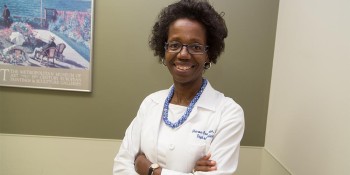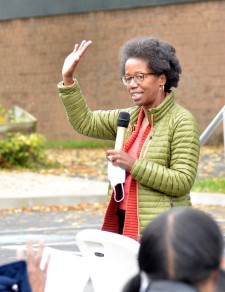Dedicated to helping the aging, Dr. Brangman helps CNY patients gain access to cutting-edge Alzheimer’s treatments
Sharon Brangman, MD has made a name for herself as the Chair of Geriatrics at Upstate and the director of the Center of Excellence in Alzheimer’s Disease (CEAD). Her interest in caring for the aging began early in her career.
“When I was in training, I found that I enjoyed working with my older patients the best because they are so grateful for anyone who took the time to try to help them; they were used to being marginalized or not paid attention to in the healthcare system. Our society puts a lot of value on youth and a lot of older people may feel that they're not really being listened to. It’s a shame, because we're all going to get older and we're all going to want good medical care.”

Sharon Brangman, MD, Chief of Geriatrics, Director of Center of Excellence for Alzheimer's Disease (CEAD)
Brangman’s interest in helping older patients naturally led her to study the diseases primarily associated with aging; dementia and Alzheimer's. Now, she’s the head of a center dedicated to applying the latest research available to help patients at every level of memory loss.
“Part of what we do at the CEAD is help people differentiate normal aging from what might be the signs of a disease process. If it is signs of a disease process, what can we do to intervene to maybe slow it down or just to help that person have the highest quality of life for as long as possible? That's what we can offer in some of these clinical trials because they are based on some of the newest theories on how to intervene when somebody has Alzheimer's disease. I tell my patients this may be an opportunity to get a medicine that is going to be approved in a few years, getting the benefits sooner rather than later.”
“We want to offer our patients and really, even if you're not a patient, to offer people in our area the opportunity to participate in clinical trials for cutting-edge novel medications that are in the pipeline,” explains Brangman. "As we know, right now there is no cure for Alzheimer's disease, but there are a number of encouraging medications that are being studied that may help to either reduce or postpone some of the decline that we see in people who have Alzheimer's.”
Brangman says just having a center like the CEAD in Syracuse is helpful to those dealing with dementia. “Prior to us having this kind of regional outreach program, patients who wanted to participate in clinical trials had to go to Boston or New York City. And that's quite a stressor, because it's a big trip and it's out of town. Now we're able to offer patients services right here in Central New York.”
The team at the CEAD can help patients and families make the best decisions about participating in a clinical trial. “You don't have to participate. We still take care of people who decide not to be in trials. But if you want to be in a trial, we have a very comprehensive list of potential trials that would probably fit most people's interests.” Brangman explains there are trials available for every stage of the disease; from mild memory loss and impairment to moderate Alzheimer's disease. “People along that whole continuum of memory loss have an option to participate,” she says. They even recently participated in a trial for people with advanced Alzheimer’s disease with agitation that just ended.

Dr. Brangman speaking at a community outreach event about healthcare for seniors, and the importance of diversifying clinical trials.
“People often say, ‘I want to try to help find a cure or a treatment, so my grandchildren don't have to deal with this’,” says Brangman about why people choose to enroll in clinical trials. “I find that people have a real sense of responsibility or interest in helping to contribute to our scientific knowledge so that we can really figure out how to treat, how to prevent, and how to make Alzheimer's disease something that we don't have to worry about.”
Brangman acknowledges some of the barriers that exist that may prevent patients from saying yes to a clinical trial, and her team works to provide solutions. For people who may not have a reliable way to the clinical trial office, transportation services can be arranged. Some patients are wary of needles; for some studies there can be non-injection options.
“Many of our patients want to be sure that they get the actual drug because when we're doing a clinical trial somebody gets the placebo, or the dummy drug, and somebody gets the real drug.” Brangman explains that while they don’t have control or even knowledge of who gets the real drug or placebo (“The drug companies don’t let us know that information usually until after the study is completed and submitted to the Food and Drug Administration (FDA) for approval” she says) some trials have the option to go “open label” at the end of the first phase so that everyone still involved can get the real drug. Also, if a study shows remarkable results, they will usually offer the drug to everyone in the study, including the placebo participants, until it’s approved and available to the public.
Brangman and her team are also making headway on improving diversity in clinical trial participants. “On a national level, there has been less representation of African Americans, Latinos, Native Americans and Asians,” she says. “We received a grant from the National Institute of Aging to help increase the representation of diverse populations in clinical trials. We have created a unit that we call our ‘Equity Research Core’ which has been very successful in helping some of our collaborators who had difficulty recruiting diverse patients to really improve their recruitment in these communities.”
Brangman wants to make sure the CEAD is a resource for the entire community. “There are people who might have a concern about their memory and they can certainly contact us directly; you don't have to be one of our patients. The other benefit that comes from participating in a clinical trial is that people often get a very good evaluation at no cost to them. They may be eligible to get an MRI of their brain and other services that normally they wouldn't get without a formal work up in doctor’s office. We can provide them with some good information about their cognitive status.”
If you’re interested in learning more about the CEAD or inquiring about their services, you can visit their website at www.upstate.edu/geriatrics/healthcare/cead or call them at (315)464-6100. For information on clinical trials being offered, you can visit their website at www.upstate.edu/geriatrics/research/clinical-trials.php or email geriresearch@upstate.edu or call (315)464-3285.